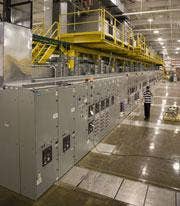Facility Lets VARs Test Power Systems Before Installation

For example, how will VARs know for sure if all of the chosen pieces of equipment are adequate and will work together once everything is in place? And putting everything in place is no casual matter, either.
Emerson Network Power is addressing those concerns with its new Liebert Adaptive Power Witness Test Center, a 25,600-square-foot facility in Delaware, Ohio, that enables critical power systems to be tested for interoperability and performance. The facility lets VARs avoid all the effort, equipment and man hours required to do testing of this magnitude.
The Liebert center, opened last month during Emerson's AdaptiveXchange event, tests large UPS systems before installation to ensure that the equipment will meet the necessary performance levels. Components such as UPS modules, distribution switch gear and power storage flywheel units are tested independently and as part of complete systems to document performance.
Customers and/or their consulting engineers can watch the testing from an observation station that overlooks the test bays. Test data, waveforms, procedures and results are shown on four LCD displays in the observation station, and customers receive a final report of the test results.
Plans are in the works for the testing to be viewable over the Internet so customers won't have to go to the facility to see the testing.
The Liebert center has four test bays, each with four UPS modules and a 4-megawatt capacity. If necessary, the bays can be interconnected for greater capacity. Each test bay supports steady state, dynamic, overload and fault testing. The results certify the equipment for proper voltage regulation, waveform, harmonics, frequency and efficiency. Customers also can request that special tests be performed.
Large systems typically take five days to test, and the equipment doesn't need to be purchased before testing.
Testing typically costs from 1 percent to 5 percent of the system price. Specific prices depend on the size and price of the UPS system being tested and whether any additional tests are requested. But the tests let potential customers see how a complex power system will perform under real-world conditions before they plunk down a lot of money on the equipment and its installation.
MARC SPIWAK is a technical editor for the CRN Test Center.